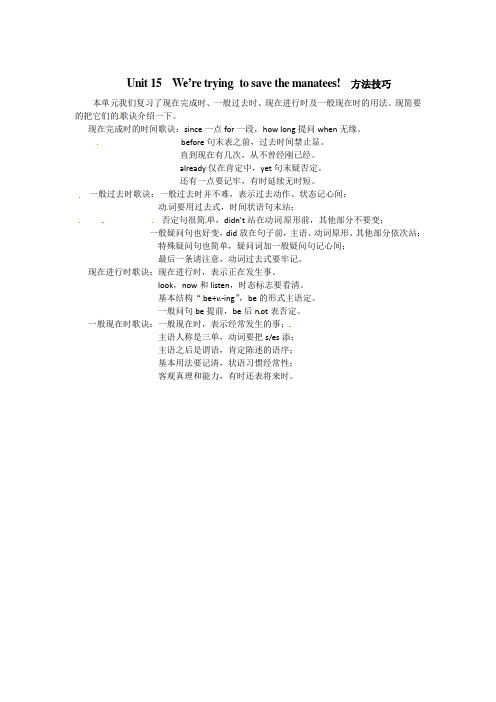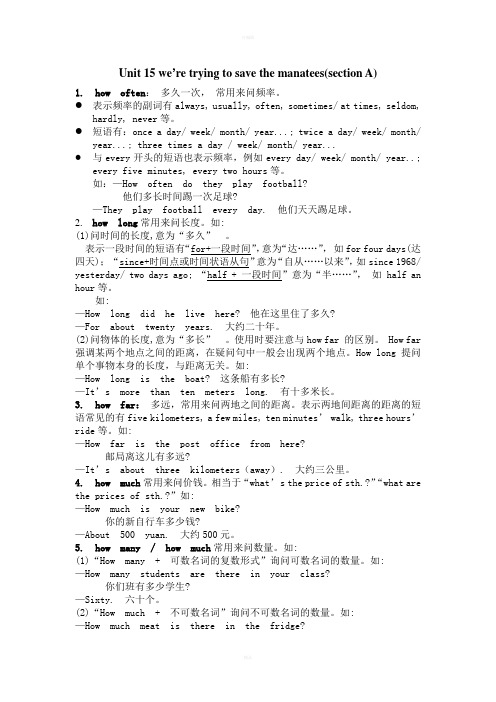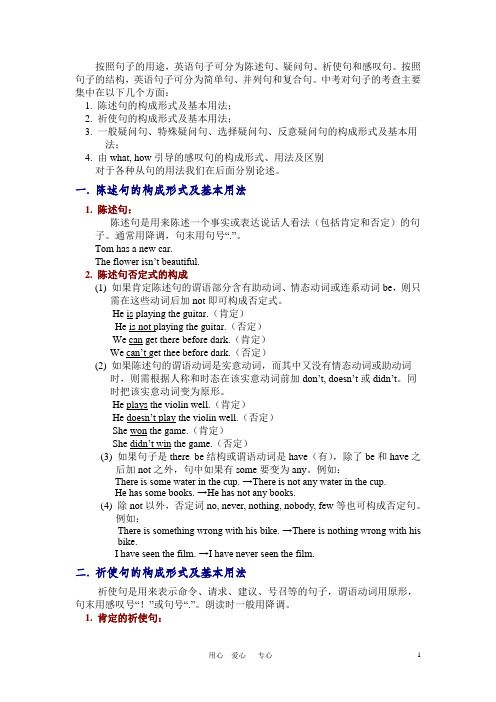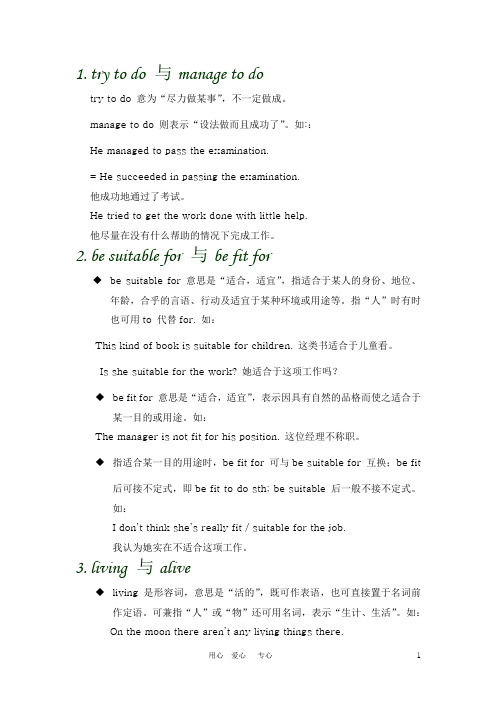新目标九年级英语 Unit 15 重点词句讲解
九年级Unit15重点

主要单词
• • • • • • • • • • 1.称;称…重量 2.磅 3.极小的;微小的 4.词语;表达方式;表达 5.build的过去式和过去分词 6.拉;拖;拔 7.行星 8.社团;社会 9.多余的;空闲的 10.模型
主要短语
• • • • • • • • 1.关心;关怀;照顾 2.反对做某事 3.适合… 4.为…提供… 5.强烈要求/极力主张某人做某事 6.用…制成/建造成 7.用…做成 8.赢得一个奖
• 7.它们每天只喂一次食物.(give) • 8.它们为濒临灭绝的动物提供家园并且有助于教育 公众有关关心它们.(provide) • 9.循环利用纸张的确很容易.()
• 10.她是一位最不寻常的女人.
• 11.这些材料过去被称为垃圾.(call) • 12.这些墙是由旧玻璃瓶制成的.(make) • 篱笆是用用过的苏打罐做成的。(build) • 房顶是用丢弃的瓦片做成的.(多大?他们大约10英尺长,重约法1000磅. • 2.过去有许多海牛.(used)
• 3.1972年,人们发现它们濒临灭绝.
• 4.一些沼泽变得污染了.(become) • 5.我无法相信我所看到的.(see) • 6.动物们被关在狭小的笼子里,几乎一点都不能动.(keep)
2014届九年级英语(下)(人教新目标)Unit 15 We're trying to save the manatees!方法技巧

Unit 15 We’re trying to save the manatees! 方法技巧
本单元我们复习了现在完成时、一般过去时、现在进行时及一般现在时的用法。
现简要的把它们的歌诀介绍一下。
现在完成时的时间歌诀:since一点for一段,how long提问when无缘。
before句末表之前,过去时间禁止显。
直到现在有几次,从不曾经刚已经。
already仅在肯定中,yet句末疑否定。
还有一点要记牢,有时延续无时短。
一般过去时歌诀:一般过去时并不难,表示过去动作、状态记心间;
动词要用过去式,时间状语句末站;
否定句很简单,didn’t站在动词原形前,其他部分不要变;
一般疑问句也好变,did放在句子前,主语、动词原形、其他部分依次站;
特殊疑问句也简单,疑问词加一般疑问句记心间;
最后一条请注意,动词过去式要牢记。
现在进行时歌诀:现在进行时,表示正在发生事。
look,now和listen,时态标志要看清。
基本结构“be+v.-ing”,be的形式主语定。
一般问句be提前,be后n ot表否定。
一般现在时歌诀:一般现在时,表示经常发生的事;
主语人称是三单,动词要把s/es添;
主语之后是谓语,肯定陈述的语序;
基本用法要记清,状语习惯经常性;
客观真理和能力,有时还表将来时。
人教版新目标 九年级英语全册重点短语和句型总结

九年级重点短语和句型Unit1 How can we become good learners?重点短语1. ask the teacher for help 向老师求助2. work with friends 和朋友一起学习3. study for a test 备考4.have conversations with sb,与……交谈5.read aloud 朗读speak loudly 大声说话6.speaking skills 口语技巧spoken English英语口语7.too…to… 太……而不能8.look up the words in a dictionary 查阅;look up抬头看9.It takes time 慢慢来,不着急10.the 比较级…the 比较级…,越…越…The more you read ,the faster you will be.11.it is adj for sb to do sth.find/think/make it adj (for sb) to do sth发现某人做某事I find it important (for us) to learn English.12.so that 以便,为了13. be afraid of doing sth. / be afraid to do sth. 害怕做某事……14.fall in love with 爱上15.something interesting 有趣的事情16.body language 肢体语言17.expressions on their faces 面部表情18.the secret to ( doing) sth .......的秘诀19.as well 也20.It’s a piece of cake.小菜一碟21.have a better understanding of 对...有更好的理解22.take notes 记笔记23.do sth by doing sth 通过某种方式做某事24.do grammar exercises 做语法习题25.memorize sentence patterns 记句型26.keep a diary 写日记27.make mistakes( in …)在……方面犯错误mistake A for B 错把……当成……28.increase to增加到…/ increase by增加了…29.at a /the speed of 以…的速度30.talk to sb.和某人交谈31,be born with 天生具有32.Whether or not…是否;Whether… or…无论是…还是…33.depend on 依靠依赖34.have something in common 有一些共同之处35.pay attention to (doing) sth 注意关注(做)某事36. connect …with …/ connect …to …把…和…联系37.think about 考虑38.even if 即使尽管纵容39.look for 寻找40.worry about 担心担忧41.word by word 一字一字地42so……that 如此……以至于43.the ability to do sth. 做某事的能力44. practice makes perfect.熟能生巧45 learn from….从/向….学习46.learning habits 学习习惯47.get bored 感到无聊48. be stressed out 焦虑不安的49. instead of 代替…50.over and over again 反反复复地51. from time to time. 有时52. on one’s own 独自一人,依靠自己53. develop one’s study skills.培养某人的学习技巧。
九年级英语全册《Unit 15 We’re trying to save the

《Unit 15 We’re trying to save the manatees!》讲解1.语言目标Debate an issue2.重点词汇save gentle furry enormous playful aggressive gray spotted African strong mangrove swamp habitat aquatic feed underwater vegetation foot weigh pound against suitable tiny cage educate public urge recycle stuff material pull bottle glue roof discard tile fence can inspiration spare politely environmentcare for pull down be made from3.关键句型We’re trying to save the manatees!I am like this animal…T hey’re about 10 feet long and they weigh about 1, 000 pounds.I don’t think so.I disagree with you.Recycling paper is easy.But it’s hard to stop riding in cars.4.语法复习现在进行时,一般现在时,一般过去时及used to的用法,被动语态和现在完成时。
课前学习提示一、词汇1. save [seiv]vt. &vi. 抢救, 节省, 储蓄, 顾全。
【例】(1)The doctors tried their best to save the patient’s life.大夫们尽力抢救这个病人。
(2)Your kind help saved me a lot of trouble.你好心的帮忙省了我很多麻烦。
新目标英语九年级第十五单元重点内容总结

九年级第十五单元重点内容总结一、词汇(一)基础词汇1、manatee(海牛)2、cheetah (猎豹)3、kangaroo(袋鼠)18、vegetation(植物;草木的总称)19、swamp(沼泽;沼泽地)20、be made from(由……制成;由……构成)21、environment(环境;生态环境;自然环境) 23、educate(教育;培养)24、public(公众的;民众的)25、politely(礼貌地;客气地)26、African elephant(非洲象)27、feed(牧草;饲料)39、glue(胶合;粘贴;粘合)40、roof(屋顶;房顶)41、discard(丢弃;放弃)42、tile(瓦片;瓷砖)43、fence(栅栏;围墙)44、inspiration(灵感;鼓舞人心的人或事物)45、spare(多余的;空闲的)46、can(金属罐)12.be suitable for sb to do sth适合某人做某事13.be surprised to do sth惊讶地做某事14.living textbooks活生生的教材15.provide sth for sb.提供某物给某人16.provide sb with sth提供给某人某物29.in one’s spare time在某人的空闲时间30.raise money 捐钱二、日常用语1. manatees are gentle. 海牛很温顺。
2. I like pandas best because they are so cute.我最喜欢熊猫了,因为它们太可爱了。
3. I agree / disagree with you. 我同意/不同意你的意见。
(1)try to do 努力做例如:I tried hard not to laugh.我极力忍住不笑。
(2)try doing 试做(可达到目的的方法)例如:If the car won’t start,try pushing it.如果这车发动不了,试着推一推它。
九年级Unit13-15单元知识点总结

Unit 13---Unit15 疑难点一、疑点难点破解1. You have to be careful.你得小心。
疑点:be careful“小心,当心”如:Be careful while crossing the road.过马路要小心。
难点:be careful后常跟of短语。
与它同义的有look out。
如:Aren’t you a bit too careful of your health?你对个人的健康难道不是有点过于小心了吗?Look out!There’s danger ahead.当心!前面有危险。
2. At times an ad can lead you to buy something you don’t need at all.有时广告可能导致你买你根本不需要的东西。
疑点:at times= sometime,是副词性短语,表示事物发生的频率。
如:He is late for school at times.他有时上学迟到。
难点:1)对含有at times的短语进行提问时,用How soon.如:How soon does he go to school late?At times.2)句中lead意为“使得、导致”,常用于短语lead sb. to do sth.“导致某人做某事”如:What leads you to think so?3.Soft lighting makes people look good,but it make food look bad.柔和的光线使人的脸色看上去很好看,但使食物看起来很难看。
疑点:look good/bad意思为“外表的颜色看起来好看/难看”如:The traffic accident made him look bad.难点:look fine/ well指看起来身体健康如:You look better today than yesterday.你今天看上去比昨天好多了。
九年级英语第十五单元知识点

九年级英语第十五单元知识点九年级英语第十五单元知识点一. 重要词汇和句型1. 含有ful 的词beautiful 美丽的successful 成功的peaceful 和平的hopeful 有希望的wonderful极好的useful 有用的fearful 害怕的helpful有帮助的careful小心的colorful 富有色彩的thankful感谢的powerful 强大的2. like 喜欢He likes apples very much .Do you like playing basketball ?like 像……那样的He wants to be a teacher like Mr Zhang .be like 像…… ; 如…… Jim is like his father . They are both very clever . look like 看起来像Zhang Wei looks like his brother .what does he like ? 他喜欢什么?What’s he like ? 他是个怎样的人? ( 强调性格\品质)He’s very friendly and helpful .What does he look like ? 他长什么样子? ( 强调外貌)He is tall and strong .3. 表达某物长(long )\ 宽(wide )\ 高(tall ) \ 深(deep) \ 厚(thick )等的句子The road is 20 meters wide .The tree is more than fifty years old .The well is about 30 meters deep .4. weigh 动词(1)称……的重量He weighed the fish .Can you weigh the apples for me ?(2) 盘算She weighed the ideas in her mind .(3) 重要His suggestion does not weigh with me .5. there used to be 过去曾有……There used to be a shop across from the school .There didn’t use to be any school in this area .6. be against doing sth. 反对做某事He is against cutting down these trees .Are you against having a picnic tomorrow ?7. be suitable for sb. ( to do sth ) 适合某人(做某事)Many people agree that this city is suitable for people to live in .Do you think the program is suitable for children ?8. provide sth for sb. === provide sb. with sth. 为某人提供某物Mr Smith provides food for us .== Mr Smith provides us with food .9. educate 动词, “教育, 培养”She educates her daughter at home .It’s not easy to educate teenagers .education 名词, “教育,培养”His son got a good education .10. support (1) 动词, “供养”He needs a high income(收入) to support such a large family .Her father supported her until she got married .(2) 动词, “支持”Which football team do you support ?(3)名词, “支持, 帮助, 鼓励”Jim was a great support to them after their father died .11. urge 动词, “强烈主张, 强烈要求”urge sb. to do sth. 催促\ 力劝某人做某事the shopkeeper urged me to buy a hat .I urged him to be a good father .12.recycle 动词, “回收利用”。
九年级第15单元知识点

九年级第15单元知识点本篇文章将重点介绍九年级第15单元的知识点,旨在帮助同学们更好地理解和掌握相关内容。
本单元的知识点主要包括动词时态、情态动词和被动语态三个方面。
下面将对这三个方面逐一进行详细介绍。
动词时态是指动词表示的动作或状态与时间的关系。
在英语中,动词时态主要包括一般现在时、一般过去时和一般将来时。
一般现在时用于表示习惯性或经常性的动作,例如:“I eat breakfast every day.”(我每天吃早饭。
)一般过去时用于表示过去的动作或状态,例如:“He played soccer yesterday.”(他昨天踢足球。
)一般将来时用于表示将来的动作或状态,例如:“We will go to the park tomorrow.”(我们明天将去公园。
)情态动词是一类特殊的动词,用来表示说话人的情态、意愿、推测、建议等。
常见情态动词包括can、could、may、might、shall、should、will、would等。
情态动词具有一定的时态和语气特点,例如:“He can swim very well.”(他游泳游得很好。
)“You should study ha rder.”(你应该更努力地学习。
)情态动词的用法较为灵活,需要根据语境来确定具体的表达意义。
被动语态用于强调动作的承受者而非执行者。
被动语态的构成由“be”动词加上动词的过去分词形式构成,例如:“The book was written by him.”(这本书是他写的。
)被动语态在英语中应用广泛,特别是在科学、新闻和官方文体中经常出现。
通过掌握动词时态、情态动词和被动语态的用法,同学们可以更准确、流利地表达自己的意思,并对他人的表达进行理解。
在实际应用中,同学们还需注意词序和时态的统一,避免在表达时出现错误。
希望本篇文章对同学们在九年级第15单元的学习有所帮助,通过理解和掌握动词时态、情态动词和被动语态,同学们可以提高自己的英语语言水平。
新目标九年级英语Unit15复习

What did you see A: 2___________________________________?
B: We saw a lot of endangered animals, like manatees, pandas, chimpanzees (黑猩猩)and so on.
REUSE You don’t need new bags every time you go to the store. Reuse the old ones---and you had better use cloth bags, not plastic ones. REFUSE Stop buying anything that is over –packaged. Also look for products that come in boxes made of recycled cardboard(硬纸板). RECYCLE People can use cans, newspapers and plastic bottles again. So don’t throw them away. Send them to the recycling center.
* Fill in the chart.
House parts Things made from
The walls old glass bottles used soda cans discarded tiles
1. Who is Amy Winterbourne? 2. Did she win an award? What’s it? 3. What does she do in her spare time?
九年级英语第15知识点

九年级英语第15知识点在九年级英语中,第15个知识点是非谓语动词。
非谓语动词是指在句子中充当动词的形式,但不作谓语动词使用。
在这一知识点中,我们将学习不定式、动名词和现在分词的用法和特点。
不定式是非谓语动词的一种形式,由"to"加上动词原形构成,例如:"to eat","to run"等。
不定式常常被用作动词的宾语、补足语或定语。
例如:"I want to eat an apple."(我想吃一个苹果。
)在这个句子中,不定式"to eat"作为动词"want"的宾语;"an apple"是宾语的补足语。
动名词是非谓语动词的另一种形式,由动词的现在分词形式加上"ing"构成。
例如:"singing","running"等。
动名词可以作主语、宾语、表语、定语或状语。
例如:"Swimming is my favorite sport."(游泳是我最喜欢的运动。
)在这个句子中,动名词"swimming"作主语。
现在分词是非谓语动词的第三种形式,由动词的现在分词形式加上"ing"构成。
现在分词可以作定语、状语或表语。
例如:"The girl standing there is my sister."(站在那里的女孩是我的妹妹。
)在这个句子中,现在分词"standing"作定语,修饰"girl"。
非谓语动词具有许多特点和用法。
首先,非谓语动词可以省略主语,尤其在非常明确的情况下。
例如:"Having finished his homework, he went out to play."(他做完作业后出去玩。
人教版九年级-Unit15(sectionA)知识点

Unit 15 we’re trying to save the manatees(section A)1. how often:多久一次,常用来问频率。
●表示频率的副词有always, usually, often, sometimes/ at times, seldom,hardly, never等。
●短语有:once a day/ week/ month/ year...; twice a day/ week/ month/year...; three times a day / week/ month/ year...●与every开头的短语也表示频率,例如every day/ week/ month/ year..;every five minutes, every two hours等。
如:—How often do they play football?他们多长时间踢一次足球?—They play football every day. 他们天天踢足球。
2.how long常用来问长度。
如:(1)问时间的长度,意为“多久”。
表示一段时间的短语有“for+一段时间”,意为“达……”,如for four days(达四天);“since+时间点或时间状语从句”意为“自从……以来”,如since 1968/ yesterday/ two days ago; “half + 一段时间”意为“半……”,如 half an hour等。
如:—How long did he live here? 他在这里住了多久?—For about twenty years. 大约二十年。
(2)问物体的长度,意为“多长”。
使用时要注意与how far 的区别。
How far 强调某两个地点之间的距离,在疑问句中一般会出现两个地点。
How long 提问单个事物本身的长度,与距离无关。
如:—How long is the boat? 这条船有多长?—It’s more than ten meters long. 有十多米长。
新目标九年级英语第15单元短语

Unit 15 We’re trying to save the manatees!1、try to do sth. 设法做某事try doing sth. 试着做某事2、10 feet long 10英尺长3、be against doing sth. 反对做某事4、in one’s life 在一生中=in life5、once a day 每天一次6、be surprised to do sth. 做某事感到惊奇7、provide sth. for sb. =provide sb. with sth. 提供某事物给某人8、care for 关心;关怀;照顾care about 关心;担心9、take care of 照顾=look after10、agree to sth. 同意某事agree to do sth. 同意做某事agree with sb. 同意某人11、turn off 关掉turn on 打开turn up 调高turn down 调低turn over 翻过来12、stop doing sth.停止做某事=give up doing sth.Stop to do sth. 停下来做某事13、hear of 听说=hear aboutHear from 收到某人的来信=get /receive a letter from sb.14、pull down 推倒15、be made from 由……制成(不能卡不出原材料)be made of 由……制成(能看出原材料)be made up to 由……组成16、be suitable for 对……适合=be fit for。
人教版九年级英语unit15短语句型和语法课件

• • • • • •
1.挑畔的 aggressive 2.有斑点的 spotted 3.我像这种动物,因为我身体强壮又聪明。 I am like this animal because I am strong and intelligent. • 4.它们灭绝的原因。 • Reason why they are endangered.
单词
• n海牛 • adj. 毛皮的,似毛皮的, 长有毛皮的 • adj. 巨大的,庞大的 • adj. 顽皮的,爱玩耍的 • adj. 侵犯的,挑衅的 • adj. ﹠n. 灰色(的); 偏灰色(的) • adj. 有斑点的,有点子 的 • n. 袋鼠 manatee furry enormous playful aggressive gray spotted kangaroo
• 4.窗户和门来自城镇里被拆掉的旧建筑物。 • The windows and doors came from old buildings around the town that were being pulled down. • 5.墙壁是用旧玻璃瓶加胶水黏合而成的。 • The walls are made from old glass bottles that are glued together. • 6.埃米对我们来说是一个鼓舞。 • Amy is an inspiration to us all.
• 4.噢,这些材料过去常被称为垃圾,但是现在 被称为“循环再利用”材料。 • Well,the stuff used to be called trash,but now it’s called “recycled” material. • 5.屋顶由废弃的瓦片制成。 • The roof is made from discarded tiles.
九年级英语新目标第15单元知识点汇总

初三英语新目标15单元知识点汇总基础知识预览课标考点详解1.save v.挽救;营救save one’s life 救……的命It was too late to save the boy and he died.男孩未获得及时抢救,所以死了。
They the old man the fire yesterday.A.save;from B.saves;to C.saved;from D.saved;through点拨:句意为“昨天他们从火海中救出了这位老人”。
此句为一般过去时,“从……之中”要用from表示,所以选C项。
2.aggressive 是一个形容词,意思是“侵犯的。
挑衅的”。
它可以用英语解释为“ready or likely to aght or argue”。
它用作形容词还可以表示“有进取心的”。
He is very aggressive.他生性好斗。
The men were drunk,aggressive and looking for a fight.那些人喝醉了,一副挑衅的架势,想找人打架。
模拟演练—用所给动词的适当形式填空He is an (act)boy。
3.spotted是由动词spot的过去分词转化而来的形容词。
意思是“有斑点的”。
The floor was spotted with paint.地板上有很多油漆污点。
spot可以用作动词表示“看出,认出”的意思。
它用作名词可以表示“斑点,污点;地点”等意思。
Luckily,the enemy planes were spotted early.幸亏及早发现了敌机。
I spotted a break in the fence and headed towards it.我看到篱笆破了一块,便朝那里走去。
She had spots on her face when she was ill.当她生病的时候,她脸上有斑点。
九年级英语 unit 15 语法要点 人教新目标(Go for it)

按照句子的用途,英语句子可分为陈述句、疑问句、祈使句和感叹句。
按照句子的结构,英语句子可分为简单句、并列句和复合句。
中考对句子的考查主要集中在以下几个方面:1. 陈述句的构成形式及基本用法;2. 祈使句的构成形式及基本用法;3. 一般疑问句、特殊疑问句、选择疑问句、反意疑问句的构成形式及基本用法;4. 由what, how引导的感叹句的构成形式、用法及区别对于各种从句的用法我们在后面分别论述。
一. 陈述句的构成形式及基本用法1. 陈述句:陈述句是用来陈述一个事实或表达说话人看法(包括肯定和否定)的句子。
通常用降调,句末用句号“.”。
Tom has a new car.The flower isn’t beautiful.2. 陈述句否定式的构成(1) 如果肯定陈述句的谓语部分含有助动词、情态动词或连系动词be,则只需在这些动词后加not即可构成否定式。
He is playing the guitar.(肯定)He is not playing the guitar.(否定)We can get there before dark.(肯定)We can’t get thee before dark.(否定)(2) 如果陈述句的谓语动词是实意动词,而其中又没有情态动词或助动词时,则需根据人称和时态在该实意动词前加don’t, doesn’t或didn’t。
同时把该实意动词变为原形。
He plays the violin well.(肯定)He doesn’t play the violin well.(否定)She won the game.(肯定)She didn’t win the game.(否定)(3) 如果句子是there be结构或谓语动词是have(有),除了be和have之后加not之外,句中如果有some要变为any。
例如:There is some water in the cup. →There is not any water in the cup.He has some books. →He has not any books.(4) 除not以外,否定词no, never, nothing, nobody, few等也可构成否定句。
九年级英语 unit 15 词语辨析 人教新目标(Go for it)

1.try to do 与manage to dotry to do 意为“尽力做某事”,不一定做成。
manage to do 则表示“设法做而且成功了”。
如::He managed to pass the examination.= He succeeded in passing the examination.他成功地通过了考试。
He tried to get the work done with little help.他尽量在没有什么帮助的情况下完成工作。
2.be suitable for 与be fit for◆be suitable for 意思是“适合,适宜”,指适合于某人的身份、地位、年龄,合乎的言语、行动及适宜于某种环境或用途等。
指“人”时有时也可用to 代替for. 如:This kind of book is suitable for children. 这类书适合于儿童看。
Is she suitable for the work? 她适合于这项工作吗?◆be fit for 意思是“适合,适宜”,表示因具有自然的品格而使之适合于某一目的或用途。
如:The manager is not fit for his position. 这位经理不称职。
◆指适合某一目的用途时,be fit for 可与be suitable for 互换;be fit后可接不定式,即be fit to do sth; be suitable 后一般不接不定式。
如:I don’t think she’s really fit / suitable for the job.我认为她实在不适合这项工作。
3.living 与alive◆living 是形容词,意思是“活的”,既可作表语,也可直接置于名词前作定语。
可兼指“人”或“物”还可用名词,表示“生计、生活”。
如:On the moon there aren’t any living things there.在月球上,没有任何有生命的东西。
- 1、下载文档前请自行甄别文档内容的完整性,平台不提供额外的编辑、内容补充、找答案等附加服务。
- 2、"仅部分预览"的文档,不可在线预览部分如存在完整性等问题,可反馈申请退款(可完整预览的文档不适用该条件!)。
- 3、如文档侵犯您的权益,请联系客服反馈,我们会尽快为您处理(人工客服工作时间:9:00-18:30)。
Unit 15 We’re trying to save the manatees!二.[重点词组](Key Phrases)1.be like2.try to do3. used to4. be suitable for5.be surprised to do6.care for7.take care of 8.disagree with9.ride in cars 10.in one’s spare time11.raise money三.[交际用语]1. We’re trying to save the manatees.2. Manatees eat about 100 pounds of food a day.3. There used to be a lot of manatees.4. In 1972, it was discovered that they were endangered.5. Some of the swamps have become polluted.6. Zoos are terrible places for animals to live.7. I’m writing to say that …四. [重点难点释义](Language Points)1. I am like this animal because I am strong and intelligent.Be like=look like=be similar to 像,看起来像。
如:He is like his father。
他像他的父亲。
= He looks like his father.= He is similar to his father.这里的like作介词,意思为“像”,like 还可做动词用,表示“喜欢”,like(doing)sth.喜欢做某事。
如:He likes his father very much.他很喜欢他的父亲。
Mary likes playing volleyball.玛丽喜欢打排球。
2. How big are manatees? 海牛有多大?How big... 询问体重。
以how组合的疑问词组有很多,如:how old(询问年龄),how often(询问频率),how long(询问动作持续的长短),how much (询问质量或者价钱),how far(询问距离)how many(询问数量),how soon (询问过多久)英语中表示长度、高度、宽度、深度和重量的表达法有:eg. The bridge is nearly 2000 meters long.这座桥长将近2000米。
eg. This elephant is 1000 pounds heavy./This elephant weighs 1000 pounds.这头象重1000吨。
3….they weigh about 1,000 pounds,……他们大约重1000磅。
Weigh 称……重量,测……重量。
如:He weighed the stone in his hand.他用手掂了掂这块石头的重量。
The piece of meat weighs four pounds.这块肉重四磅。
Weight 还可用做名词,重量。
如:What is your weight?你的体重是多少?4. We’re trying to save the manatees.我们正在竭尽全力拯救海牛.Try to do =try one’s best to do努力去做某事。
如:Every student should try to study hard in order to study in a university.为了进入大学学习,每个学生都应该努力学习。
5. I’m writing to say that I am against building a new zo o in our town.Against 介词,反对,违反,与……相反(=opposite)如:Are most people against the proposal?大多数人反对这项提议吗?Against 介词还有触,碰,倚,靠的意思.如:Put the piano there, with its back, against the wall.把钢琴放在那里,背靠着墙.Be against doing sth. 反对做某事,反义词组是be for doing sth, 赞成某事.如: All the people around the world are against cloning human beings.全世界的人民反对克隆人类.All of us are for peace and against war.我们都赞成和平,反对战争.6. I’ve visited a lot of zoos in my life, and I have never seen one I liked or one that was suitable for animals to live in.(1) be suitable for sb to do sth. 表示“适合某人做某事”,这里suitable 是suit的形容词形式,表示“合适的”.如:This kind of bamboo is not suitable for pandas to eat.这种竹子不适合给熊猫吃.This dress suits you very much, but unfortunately it doesn’t fit you.这套女装款式非常适合你,只可惜大小不合适.(2)to live in 在此处作animals的后置定语. 英语中动词不定式短语做名词定语,放在后面.如:There is nothing for us to worry about.我们没有什么可以担心的.7. The animals are kept in tiny cages.动物被关在极小的笼子里.Tiny=little 很小的,带有感情色彩.区别, the tiny country 国家小(含可爱的意思)a small country 小国家(与large country 相对应)a little boy 爱怜之意,(不含身材矮小)tiny 和little 常做定语,一般不做表语,small 既可以做定语,也可以做表语. Little 还可表示“一点点的”,修饰不可数名词.如There is a little milk in the bottle.瓶里有一点点的牛奶.8.I was surprised to find hardly anyone there.我非常惊讶地发现在那几乎没有人. Surprised 在这里是过去分词做形容词.常用词组:be surprised at sth对某事感到惊讶.be surprised to do sth很惊讶地做某事.In surprise 惊奇地To one’s surprise 使某人惊奇地.如:I was surprised at the news to hear the news. 听到这个消息我很吃惊.Surprise =amaze 使……惊讶Surprising 惊讶的(侧重指事物本身具有的特点),如:His words surprised me.他的话使我大吃一惊.It is surprising news.它是一个令人惊讶的消息.9. They provide homes for many endangered animals, and help to educate the public about caring for them.(动物园)他们为许多濒危的动物提供了家,也有助于教育众人来关心这些动物.Provide sb with sth.Provide sth for sb 提供给某人某物The firm provided me with a car.公司给我一辆汽车.Can you provided accommodation for thirty people?你能为30人提供住宿吗?Provide for sb 供应某人所需.如:They worked hard to provide for their large family.他们努力工作以供养一家人.He has a large family to provide for.他要养活一个大家庭.The public 指“民众,公众”.在英语中,定冠词the 后接形容词表示一类人.如: The young 年轻人the wounded 受伤的人Care for 可做“照顾,照料,看护”的意思.如:Would you like care for a cup of tea?你要不要来杯茶?10. I urge all of your readers to visit our wonderful zoo soon.我们竭力主张你们所有的读者赶快来参观我们的很棒的动物园.Urge 力劝,鼓励,怂恿,极力主张,强调.如:They urged us to go with them.他们怂恿我们一起去.She urged the important of speed.她强调速度的重要性.Urge 强烈的欲望,冲动, urgent 紧急的.如:He has an urge to travel. 他有去旅行的强烈欲望.词组: urge sth, on/upon sb 极力推荐或力陈某事物urge sb on sth 鼓励某人做某事.Urge against 极力反对11. You have probably never heard of Amy Winterbourne.你可能从没听说过艾米.温特波尼.(1)hear 听见(过去式heard,过去分词heard)hear sb do/doing sth .听见某人做/正在做某事. 如:I listened carefully but heard nothing . 我仔细听但是什么也没听到.I often hear him sing in the next room. 我常听他在隔壁唱歌.词组:hear of /about “听说, 听到”, 强调从别人那里间接得到的信息.其否定形式表示“不同意”, “不予考虑”.如:I don’t k now the writer, but I have heard of him. 我不认识这位作家,但是听说过他.I won’t hear of such a thing. 我不赞同此事.(2)hear from “收到……的来信, 同意”, 与词组get a letter from sb 或receive a letter from sb. 同义.如:I haven’t heard from him for a long time.我好长时间没收到他的来信了.12. Amy recently wo n…艾米最近赢得了……win 赢(过去式won ,过去分词won,现在分词winning)如:win a race /a battle /a prize 赢得赛跑/战役/战争/奖品.Win against /over sb 战胜某人.Beat 也表示“赢,打败(常接对象)”,如:Beat Class 3 /Mary /No 1. Middle School’s football team.赢/打败3班/玛丽/第一中学足球队.Lose 失败, lose to sb,败给某人.Winner 胜利者.13….and sells them to raise money for the Children’s Hospital……..并卖掉它们来为儿童医院集资.Raise (1)集结,召集,筹措,意为get or bring together. 如:Raise an army 召集一支军队Raise funds for a holiday 筹集度假费用(2)举起,抬起,意为lift up, move from a lower to a higher level.Raise one’s h ope 燃起某人的希望.Raise one’s glass to sb 向某人敬酒Raise one’s hand to sb. 象某人伸拳Raise one’s voice 提高声音(3)提出,意为:bring up for discussion or attention. 如:raise a new point 提出一新论点.Raise a new question 提出一新问题.(4) 抚养,饲养,意为:breed, grow. 如:raise pigs 养猪I was born in Wuhan and raised in Wuhan.我生在武汉,长在武汉.五.语法知识1. be(get,become)used to结构在意义上相当于accustomed to“习惯于”,从形态上看,used是个分词型形容词,to是介词,因此后面只能跟名词、代词或动名词。
